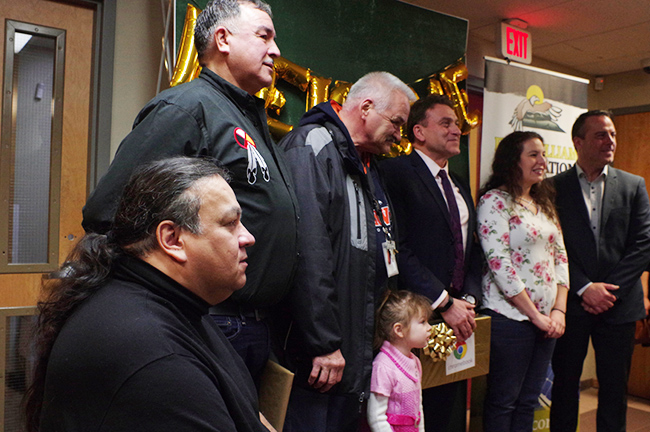Full-day Kindergarten pilot project to include culture and language

By Rick Garrick
Fort William community members are looking forward to an upcoming full-day Kindergarten pilot school through a partnership with the Thunder Bay Catholic District School Board.
“For us it means an exciting time and an exciting journey,” says Fort William Chief Peter Collins, noting that the community last had a school when he was in Grade 1 about 50 years ago. “This is a step in the right direction, and maybe a long-term opportunity for schools in our community.”
Collins says the creation of the pilot school will enable students to learn their own language. The pilot school was announced on Jan. 18 at the Fort William Council Chambers.
“The young ones are the ones who pick it up the easiest,” Collins says. “We are hoping that this is a step in the right direction to regaining that language and instilling it in our young people.”
The pilot school, which is scheduled to operate for the 2018-2019 school year, will initially involve Junior and Senior Kindergarten classes with the possibility of expansion to Grade 1 and 2 classes in the future.
“We want to expand it to at least Grade 2 because we still want our kids to go to the city … and be involved with the education there also,” says Fort William Councillor Phil Pelletier, who is also a trustee with the TBCDSB. “We want to pilot the JK-SK, but go to Grade 2 eventually.”
Collins says one of the benefits of the pilot school is that the students will not have to travel along Hwy. 61 to attend school in Thunder Bay.
“Our families will feel much more comfortable,” Collins says. “They will feel really comfortable having them here in our community and having them close to home.”
Pelletier adds that it is difficult for parents to be involved in their children’s education when their schools are not located nearby.
“It’s important for our parents to be involved with their kids in their education,” Pelletier says. “If we can get the parents more involved, it should lead to more success for the students.”
Pelletier says the pilot project will also include land-based education for the students.
“The kids learn a lot more when they are younger,” Pelletier says. “At this age, it will be a lot easier to teach them the language and some land-based programming with our Elders coming in. And I think the kids will benefit from having their parents involved.”
Deanne Bannon, one of the first parents to sign up their children for the new school, appreciates the opportunity her daughter has to attend the pilot school.
“It will be more convenient and I don’t have to worry about her being on the highway, especially because in the winter time it’s nerve wracking,” Bannon says. “It’s closer to home and it’s a nice opportunity. I wish I had this when I was her age.”
Pino Tassone, director of education with TBCDSB, says the new school will integrate cultural teachings and land-based activities as well as providing students with an opportunity to learn their own language.
“Not only that, but we will also provide before and after-school care so it is very convenient for parents to drop their child off and also pick them up at the end of the day,” Tassone says. “The reaction has been extremely positive from the First Nation community as well as from our board and the band council. It’s all about the kids — it’s about the kids wellbeing, it’s about student engagement, it’s about student achievement.”


